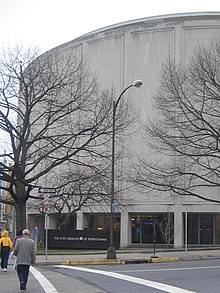 The State Museum of Pennsylvania at 300 North Street in Harrisburg, Pennsylvania The State Museum of Pennsylvania at 300 North Street in Harrisburg, Pennsylvania | |
| Former name | William Penn Memorial Museum |
|---|---|
| Established | March 28, 1905 (1905-03-28) |
| Location | 300 North St, Harrisburg, Pennsylvania, US |
| Coordinates | 40°15′56″N 76°53′09″W / 40.265672°N 76.885812°W / 40.265672; -76.885812 |
| Type | History museum |
| Collections | Pennsylvania cultural and natural history |
| Collection size | 3 million |
| Public transit access | N 3rd St & North St, CAT |
| Nearest parking | Metered parking |
| Website | statemuseumpa |
| Association of Science-Technology Centers | |
The State Museum of Pennsylvania is a non-profit history museum at 300 North Street in downtown Harrisburg, Pennsylvania, United States. It is run by the Pennsylvania Historical and Museum Commission to preserve and interpret the Commonwealth's history and culture. It is a part of the Pennsylvania State Capitol Complex.
History
On March 28, 1905, Governor Samuel W. Pennypacker signed legislation establishing the museum for "the preservation of objects illustrating the flora and fauna of the state, and its mineralogy, geology, archeology, arts and history." The State Museum of Pennsylvania mission statement was influenced by the many other state museums that were already established, including those in New York, Illinois, and Indiana.
Later in 1905, Pennypacker signed Act 481, giving the museum $20,000 in startup funding for its creation. On March 1, 1907, the museum staff and collection moved into the Executive Office Building. It became part of the Pennsylvania Historical and Museum Commission in 1945 and moved to its present building in 1964. It is located adjacent to the Pennsylvania State Capitol. The building is round, and the museum exhibits are on its ground, first, second, and third floors. The museum staff's offices and Pennsylvania Historical and Museum Commission are on the fourth and fifth floors.
In 2014, the building was listed on the National Register of Historic Places.
Exhibits
The museum's central hall features a large statue of William Penn, who founded the Province of Pennsylvania in 1681 during the British colonial era.
The museum includes a multi-media planetarium, as well as four floors of exhibits and displays covering Pennsylvania history from prehistoric times through current events. Visitation averages 315,000 people annually. Among the features are an extensive collection of artifacts and exhibitions related to the American Civil War and an extensive collection of industrial and technological innovations, including artwork, paintings, dioramas, and other audio-visuals aid in the interpretation.
There are over three million objects in the museum's collections. The museum has many exhibits that showcase Pennsylvania history. The state museum divided its exhibits into three categories; permanent, changing, and online.
References
- ^ Silverman, Sharon (2005). The State Museum of Pennsylvania: Pennsylvania Trail of History Guide. Mechanicsburg: Stackpole Books. ISBN 0-8117-3214-2.
- Smith, Eric (2005). "The State Museum of Pennsylvania: A Centennial History, 1905–2005" (PDF). Pennsylvania Historical & Museum Commission. Archived from the original (PDF) on 31 August 2021. Retrieved 20 July 2023.
- "NRHP list of weekly actions, 7/28/14 through 8/1/14". National Park Service. Retrieved 26 August 2014.
- ^ "Exhibits". The State Museum of Pennsylvania. Retrieved 20 July 2023.
External links
| U.S. state history museums | |||||||
|---|---|---|---|---|---|---|---|
| Northeast |
| ||||||
| Midwest |
| ||||||
| South |
| ||||||
| West |
| ||||||
- 1905 establishments in Pennsylvania
- American Civil War museums in Pennsylvania
- Art in Harrisburg, Pennsylvania
- Art museums and galleries in Pennsylvania
- Government buildings on the National Register of Historic Places in Pennsylvania
- History museums in Pennsylvania
- Industry museums in Pennsylvania
- Modernist architecture in Pennsylvania
- Museums established in 1905
- Museums in Harrisburg, Pennsylvania
- Museums on the National Register of Historic Places
- National Register of Historic Places in Harrisburg, Pennsylvania
- Natural history museums in Pennsylvania
- Pennsylvania State Capitol Complex
- Paleontology in Pennsylvania
- Planetaria in the United States
- Science museums in Pennsylvania
- Transportation museums in Pennsylvania
